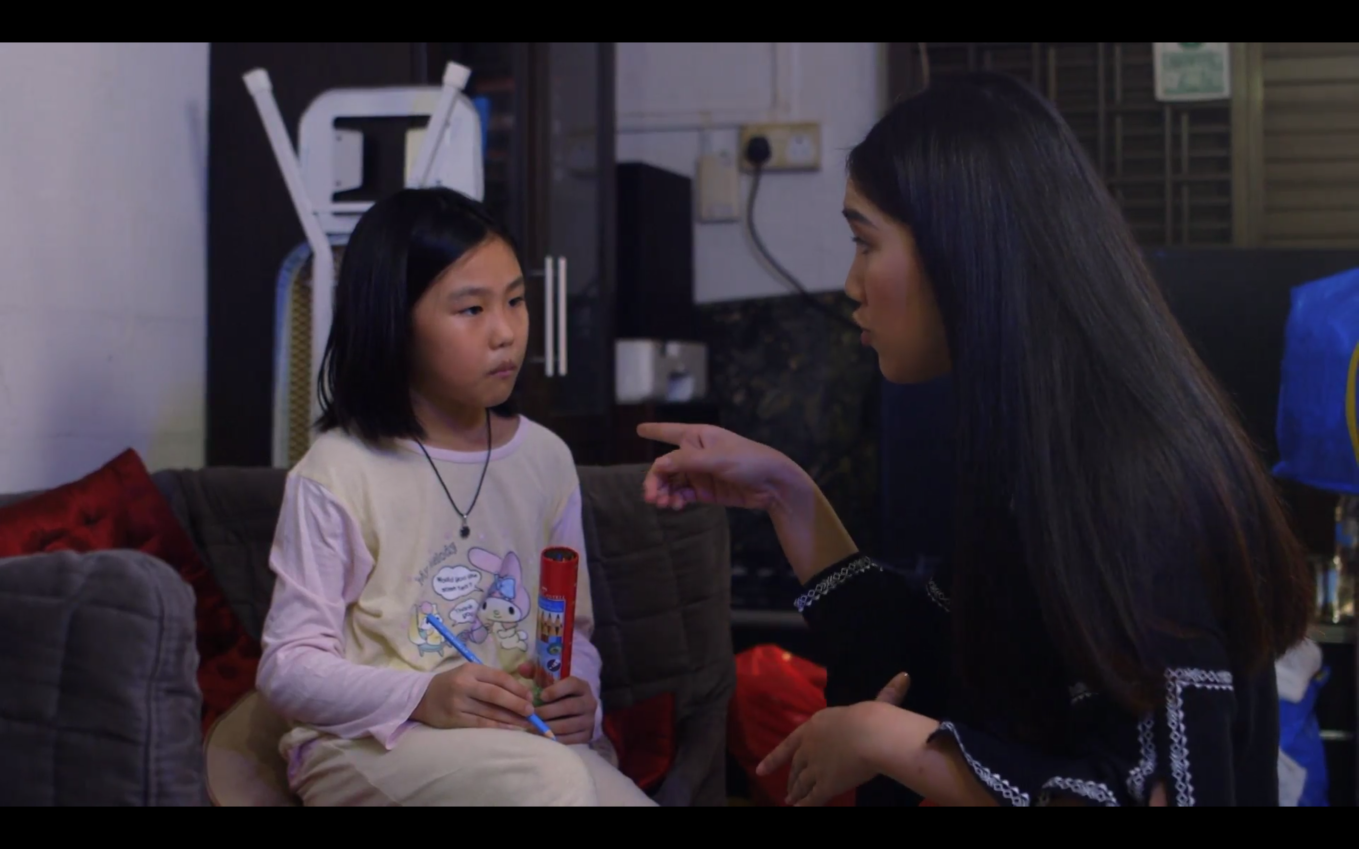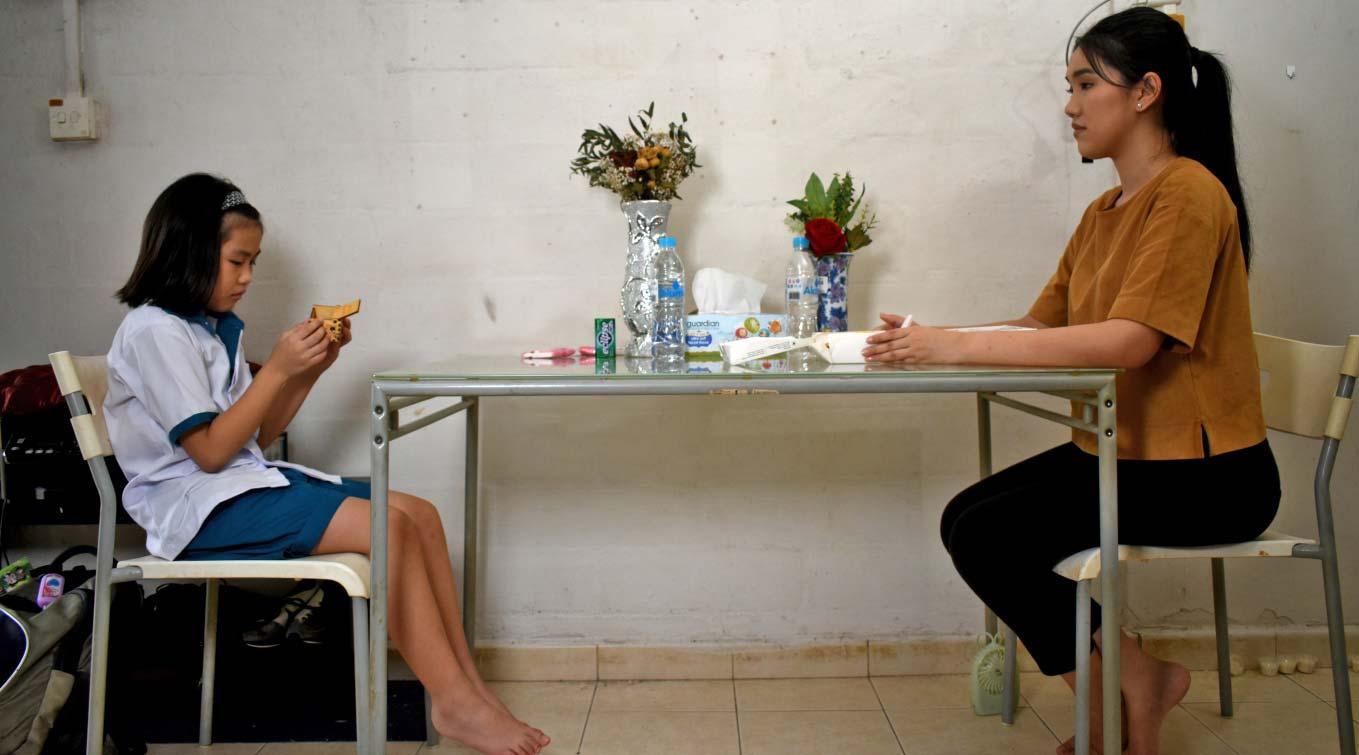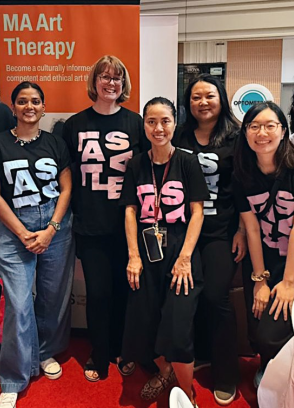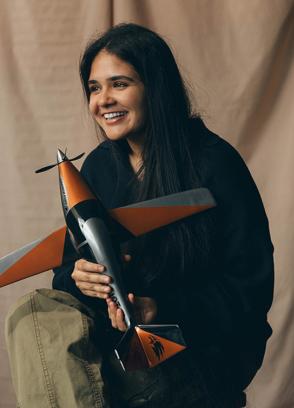Fresh from his first semester in the BA(Hons) Film programme, Cho Jun Ming reflects that getting into LASALLE was “a dream come true”, in spite of his already impressive portfolio. The self-taught filmmaker’s short films have gained recognition in local competitions and film festivals in Hainan, New York and Toronto. In 2018, the Junior Chamber International named him a Ten Outstanding Young Persons of the World Singapore Merit honoree for his cultural achievements.
All this at the age of 24—yet with these achievements already under his belt, Jun Ming chose to enrol in film school to further his studies. His first student film at LASALLE, My Only Sunshine, is a moving glimpse into the world of a Deaf girl who is bullied in school. Final year BA(Hons) Acting student Su Paing Tun collaborated with Jun Ming on this film, playing the role of the girl’s mother.
My Only Sunshine was selected for the 3rd China-ASEAN University Students' Culture Week Short Film Competition in the 21st Hainan International Tourism Island Carnival, as well as the 14th International Children’s Film Festival 2021. We spoke with Jun Ming and Su to find out more about how they worked together on the film, their challenges and takeaways, as well as their aspirations as artists.
Hi Jun Ming and Su, congratulations on the success of My Only Sunshine! Could you share a bit about the background of this film?
Jun Ming: Thank you! It has always been my dream to make films that touch on social issues. Before making this film, I definitely did not know enough about Deafness. I spent time doing research on Deaf culture and also on the psychology of child bullying, which really opened my eyes. I am especially thankful to Lily Goh of ExtraOrdinary Horizons, who taught me and Su Singapore Sign Language (SgSL) and shared stories of the Deaf community.
Su: I wound up working on this project through my BA(Hons) Acting dissertation research on integrated theatre, which is inclusive of d/Deaf and Hard-of-Hearing. I had been looking for opportunities to expose myself to the Deaf community and Deaf culture. So when I heard Jun Ming was looking for an actor for My Only Sunshine, I jumped on board.

Su, was this your first time in a role that communicates only using Sign Language?
Su: Yes, although I’ve had some experience communicating in basic Sign Language in real life through the SgSL courses I attended from Lily and the Singapore Association of the Deaf. Even though I was familiar with most of the words in the script, I was not entirely confident in my signing skills as I’m still a beginner. My challenge was to recondition the way I memorise my lines since I usually do so in English. SgSL has a different syntax from English.
I’ve always been fascinated with Sign Language because it transcends words and is very expressive, physically and emotionally. As an actor, my entry point to characters is predominantly through lines. Having to use Sign Language reminds me to be present with my entire body instead of relying on the words.
This film was definitely a new experience for you both in various ways. What were some challenges you faced while making it?
Jun Ming: This was the first film I’ve ever made without verbal dialogue. I had to think about telling the story based solely on the non-verbal interaction between both characters as well as the visuals and selective use of sound.
Su: Yes, for me the angles for the shots was a new challenge I had not faced in previous projects. Because Sign Language is very visual, we had to be very precise and I had to ensure my signs don’t go out of frame. Moreover, the signer has to stick to the rules of the dominant hand, left and right hand syntactic placement. This means that as a right-handed person, I need to use my right hand for one-handed signs. I cannot suddenly switch to signing with my left hand so it can be seen on camera. Good communication with Jun Ming and Asyraf, the Director of Photography, was really important so that we could maintain the right framing.
Jun Ming: On top of that, we made the film within a very short time in the midst of the COVID-19 pandemic. Managing timelines with a very lean crew on set was a major hurdle we had to overcome. Adeel, the little girl who plays the main character in the film, is also a first-time actor and as a director, I learned a lot from this experience about how to guide a new actor’s performance.

Jun Ming, you started off as an independent filmmaker before enrolling in LASALLE. What was your journey like?
Jun Ming: I first heard about LASALLE’s film programme when I was in secondary school. I knew it was a prominent and prestigious arts institution in Singapore and in Asia, but back then I did not have a film portfolio. So I kept working hard on my own—I was a calefare for Mediacorp and several movie productions, and took on roles in some student films and dramas, where I had the chance to observe the process and take notes on how to make films. I also analysed movies and watched YouTube.
All in all, I spent seven years self-teaching myself filmmaking, but I felt I could do more in terms of learning about film techniques and story writing. There were gaps in my knowledge that only film school could fill. I also knew that being in a film school would allow me to connect with other like-minded individuals and create films together as a team.
What are some things you've learned in film school that you felt you couldn't have picked up on your own?
Jun Ming: My Only Sunshine marks my first work as a student in LASALLE and I’ve learned so much from my classmates’ own technical knowledge and our brainstorming sessions. Everyone here is passionate about making films and helping one another to grow. The exposure from overseas festivals, where I got to learn more about different film cultures, unique film styles and narrative structures, has also been eye-opening for me.
I think being in school really gave me the opportunity to make many different kinds of films and to try new things I haven’t been able to do on my own. As an independent filmmaker, I worry about backlash or criticism from the public, but school is a safe and conducive environment where we can make mistakes and learn from one another. The guidance of our lecturers who have years of experience in the industry is also really invaluable. Most of all is the potential for collaboration between schools in LASALLE.

Speaking of collaboration, Su, this isn’t your first time partnering with students from other schools in LASALLE.
Su: Yes that’s right, I’ve been collaborating with other students since my first year in LASALLE. Aside from My Only Sunshine, I have acted in two of the one-take exercises, a commercial and two student films under the Puttnam School of Film & Animation. I have also modelled for one of LASALLE’s photography short courses and contributed a write-up for a Design Communication student’s graduation project.
I really enjoyed the Interdisciplinary Project all Level 2 students had to go through in Semester 2. I enjoy collaborating across the disciplines while we are still in a learning environment because it removes the hierarchy and enables everyone’s creative input.
For My Only Sunshine in particular, I was very glad to be a part of a cause that I’m deeply passionate about. Representation of the Deaf community and artistic collaboration with the hearing community under the social model is still not widespread. This film is a step in the right direction for greater inclusivity.
What would be a dream project for you as an artist?
Su: Aside from gaining more experience with established theatre companies in Singapore and creating my own devised work in due time, my biggest dream is to apply my skills as an actor in the accessibility art/disability art industry. For instance, I would like to become a Sign Language interpreter or shadow interpreter for theatre shows. I would also love to create a deaf-inclusive theatre collective.
Jun Ming: I would like to remember the roots of my filmmaking journey and continue making films that explore important social issues. Of course, I would like to keep taking part in prestigious international film festivals and maybe even make it to Cannes one day. Even though many people say Singapore is small and the media industry here is tough, I want to push the boundaries and contribute towards representing our own home-grown film community overseas. Once again, I would like to give a sincere big thanks to everyone involved in this film!




